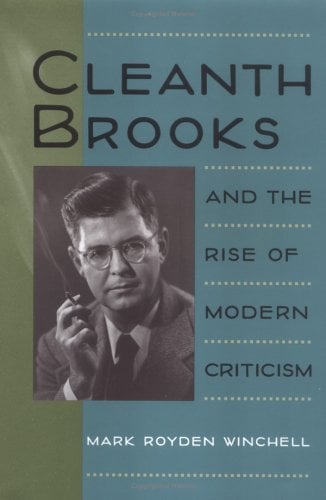This book is certainly a book—the book—for those interested in its subject, but I believe that it is a book, too, for those who have no particular interest in Cleanth Brooks (1906-1994), or in criticism. In telling the story of a man’s life, Mark Winchell has also, by placing that life in context, addressed many issues of broad concern.
The son of a Methodist minister, Cleanth Brooks was born in Kentucky. His attendance at the McTyeire school, where he studied Latin and Greek, set a seal on him early, as did his religious background. But Brooks did not find his calling until relatively late. He entered Vanderbilt in 1924, at a time when that university had on campus its most illustrious students and teachers, and when the South was already in its literary Renaissance. Poetry and criticism were in the air; the Fugitives were already publishing. John Crowe Ransom was teaching, and Donald Davidson, Allen Tate, Andrew Lytle, and Robert Penn Warren were on the campus, or the horizon. The young Brooks read a poem to one of the last meetings of the Fugitives and discovered the power of close reading in his senior year at college. Later on, his own works were to be a revelation to many a college student.
Brooks wrote a master’s thesis at Tulane on Elizabethan poetry, and met his future wife in New Orleans. But he was soon off to Oxford in 1929 as a Rhodes scholar, and not long after that he was teaching English at LSU. There he and Robert Penn Warren began a pedagogical revolution with their textbooks, the most famous of which was Understanding Poetry (1938), and edited one of the finest of all literary quarterlies, the first series of The Southern Review. By 1947, Brooks was at Yale and had published his most imposing book on poetry, The Well Wrought Urn. His work on Faulkner led to four books, the first of which, William Faulkner: The Yoknapatawpha Country (1963), is unquestionably the finest single volume devoted to America’s premier modern novelist. By the time Brooks retired from Yale, he was ready to leave an academy that was no longer the community of scholars that in one form or another he had loved and served. Hearing a fatuous paper at a conference in 1993, he finally declared, “For over 60 years now, I’ve tried to teach people how to read literature. After hearing this paper, I’m about ready to give up.” Although it was not in Brooks’ character to give up on anything, after a long and productive life he was ready to go.
Needless (or needful) to say. Brooks’ intimates included in a special sense such luminaries as William Shakespeare, John Donne, John Milton, Andrew Marvell, Alexander Pope, William Wordsworth, John Keats, Lord Alfred Tennyson, W.B. Yeats, and many another distinguished creator. His response to their work is a fascinating story in its own right, and so are the stories of his relations not only with the Agrarians but with such notables as Willmoore Kendall, Eric Voegelin, Katherine Anne Porter, Robert B. Heilman, Maynard Mack, and others. But the best thing about Winchell’s life of Brooks is his poised and decisive account of the rise (and fall) of modern criticism. Cleanth Brooks, rational and decorous as well as radical and aggressive, is the hero of that account of what followed upon the triumph of the “new criticism” he embodied. Winchell sums up more than 40 years of reaction to Brooks and what he stood for as well as it can be stated:
. . . by stressing paradox, irony, and ambiguity in literary study, the new critics were cautioning us against accepting facile and simplistic explanations of any aspect of reality. . . . by making us more careful students of language, they made it more difficult for authoritarian and venal interests to manipulate society with cliches, euphemisms, and jargon. . . . Whatever their shortcomings, the new critics realized that the enemies of literature were the enemies of humanity itself.
A good man, one as modest as he was great, Cleanth Brooks was a preternatural gentleman as well as an accomplished scholar. When the academy and criticism were the domain of such as he, his work and his demeanor were literally exemplary. Those days are gone, but the recovery has already begun. One of the signs of that recovery of mind is the very book that tells the story of a career, a life, devoted to the thought that literature is not politics but a special kind of knowledge. The ironic implication of tragedy imposes a limit to totalitarian, utilitarian, and egalitarian agendas, and the proponents of those agendas know it very well. That is why they have done so much to destroy the very concept of literature itself. Mark Winchell’s life of Cleanth Brooks is therefore more than the account of one man and of modern criticism; it is a book that speaks eloquently to pressing national issues about education, the curriculum, and the canon. I dare say it is the best critical biography we have seen in years.
[Cleanth Brooks and the Rise of Modern Criticism, by Mark Royden Winchell (Charlottesville: University Press of Virginia) 510 pp., $34.95]

Leave a Reply